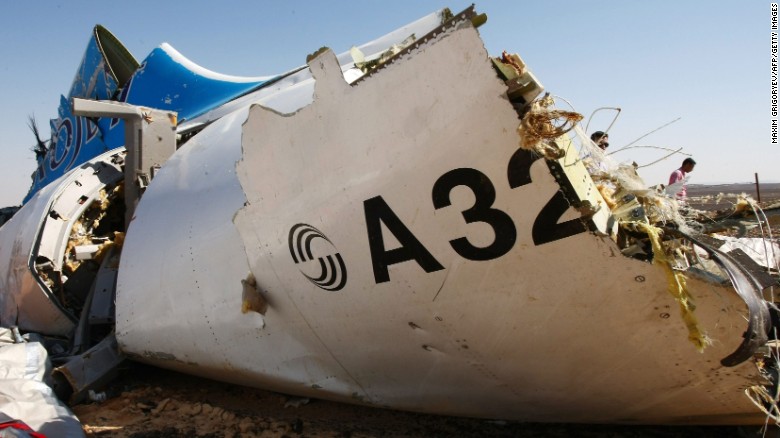European investigators who analyzed the two flight recorders from the Metrojet plane that went down last weekend in Egypt are categorically saying the crash is not an accident, CNN affiliate France 2 reported Friday.
The investigators said the cockpit voice recorder of Metrojet Flight 9268 shows an explosion and there is no sign of mechanical malfunction during the initial part of the flight, France 2 reported.
Everything is fine during the first 24 minutes, then in a fraction of a second there is a blackout and no more cockpit conversation, convincing investigators there was a bomb on board, according to France 2.
CNN Aviation Analyst Richard Quest said there would have been different data on the black boxes if there was a catastrophic failure than if there was an explosion. The key is what happened just before the data suddenly stops, he said.
“It’s this split second, and it’s a millisecond, where you hear an explosion of some description,” he said. “And you see all the parameters (on the recorders) go haywire before the power is completely lost. If this report is accurate, (investigators) have now analyzed that … heard it and they can identify it.”
If the plane had broken apart due to structural failure, there would have been more noise — and for a longer time, he said.
France’s air accident investigation agency, the BEA, told CNN that Egyptian officials will make an announcement about the crash investigation within the next 24 hours.
Meanwhile, an Egyptian Ministry of Foreign Affairs spokesman said on Twitter that the Egyptian Ministry of Civil Aviation will hold a new conference at 5 p.m. local time (10 a.m. ET) Saturday. The Foreign Affairs Ministry did not provide any detail about the topic of Saturday’s media briefing.
Also Friday, Russian President Vladimir Putin agreed to suspend Russian air traffic with Egypt until the cause of the crash can be determined, the Kremlin said.
“Putin has accepted the recommendations of the National Anti-Terrorist Committee to suspend flights with Egypt. … The President has also instructed to provide assistance to Russian citizens to return from Egypt. In addition, the President has instructed to engage with the Egyptian side to ensure the safety of air traffic,” the Kremlin said.
The United States and Britain shared their intelligence with Russia concerning the Metrojet crash before Putin made the decision to suspend flights, Kremlin spokesman Dmitry Peskov told CNN’s Matthew Chance late Friday.
Putin spoke with Egyptian President Abdel Fattah el-Sisi about the security situation in Egypt.
“The two leaders agreed to strengthen cooperation between the relevant security authorities in the two countries,” el-Sisi’s office said. “It was agreed that Russian flights to Egypt would resume at the soonest time possible.”
Russian resistance lessens
Russia had previously resisted the theory that a bomb brought down the airliner, possibly because any terrorist bombing of a Russian plane could be seen as retaliation for Putin’s decision to support Syrian President Bashar al-Assad and launch airstrikes against the terrorist group ISIS and other Assad opponents.
The airliner, carrying mostly Russian families returning from Red Sea vacations, was 23 minutes into its flight Saturday from Sharm el-Sheikh to St. Petersburg, Russia, when it disappeared from radar over Egypt’s Sinai Peninsula. A U.S. satellite detected a heat flash over Sinai. The plane broke apart and fell 30,000 feet. All aboard died.
Russia’s about-face buttressed a theory about the cause of the crash. As investigators pick through the rubble of the Russian airliner, and as Western officials sift through their own intelligence reports, some have suspected Flight 9268 was brought down by a bomb planted in its hold.
Some also think the bomb may have been smuggled on board in the Egyptian resort of Sharm el-Sheikh, where the flight departed.
Report: British Intelligence suspects bomb in hold
The bombing theory emerged late Wednesday, when Britain suspended flights from Sharm el-Sheikh to the United Kingdom because of security fears.
It became more pronounced when it was articulated by British Prime Minister David Cameron and U.S. President Barack Obama, though neither expressed it as a certainly. Cameron said it was “more likely than not” that the cause of the crash was an on-board bomb. Obama said it was “certainly possible.”
On Friday, the BBC quoted UK intelligence officials as saying the plane may have been brought down by a bomb smuggled on board by someone working at the airport in Sharm el-Sheikh. The BBC said the intelligence came from “intercepted communication between militants in the Sinai Peninsula.”
Egyptian officials publicly continue to push back against the likelihood of a bombing — perhaps concerned about the country’s crucial tourism sector — but a high-level Egyptian official who declined to be named due to the sensitivity of the matter said Friday the possibility of a bomb is “a theory we are not discarding.”
“It is one theory among many others,” the official told CNN’s Hala Gorani.
But the official also expressed frustration that U.S. and UK intelligence officials would not share information, especially when those details seem to point to an inside job at the Sharm el-Sheikh airport.
The frustration echoed that of Egyptian Foreign Minister Sameh Shoukry, who on Thursday told CNN he would “only be able to assess that conclusion if information was to be shared.”
“I believe that this information has a direct bearing on both the investigation and our status, this incident having happened on our territory. And I would have expected that if there is information, that it would have been shared with those immediately concerned,” he said.
Hossam Kamel, Egypt’s civil aviation minister, has said investigators had found no evidence to support the bomb theory.
Meanwhile, British tourists stranded in the resort when flights were suspended began leaving on eight flights that were scheduled to depart Friday.
Easyjet said one of its flights had landed Friday afternoon at London Gatwick Airport carrying 180 passengers. It was the first flight to return since flight restrictions were put in place Wednesday.
There’s still much work to be done
The intelligence on what caused the crash isn’t definitive, Obama said in an interview Thursday with Seattle radio station KIRO.
“We’re going to spend a lot of time just making sure our own investigators and own intelligence community find out what’s going on before we make any definitive pronouncements,” he said. “But it’s certainly possible that there was a bomb on board.”
Cameron said Thursday that he couldn’t confirm “with certainty” why the Russian commercial jet crashed. Still, he said, the possibility was enough of a reason to keep British citizens from flying back for several days this week from Sharm el-Sheikh, until safety measures at the resort’s airport could be improved.
Egypt is leading the crash investigation. Russia, France, Germany and Ireland also have investigators on the ground. The United States and the United Kingdom aren’t part of the investigative team combing over forensic evidence from the scene.
Did ISIS down plane?
Signs pointing to ISIS as the culprit, another U.S. official said, are partially based on monitoring of the terrorist group’s internal messages. Those messages are separate from public ISIS claims of responsibility, the official said.
In an audio message from ISIS’ Sinai branch that was posted on terror-related social media accounts Wednesday, the organization adamantly insisted that it brought down the flight.
Typically, ISIS is quick to trumpet how and who carried out any attacks for purposes of praise and propaganda. To some, the fact that ISIS hasn’t provided details in this case raised doubts about the group’s claims of responsibility.
But Paul Cruickshank, a CNN expert on terrorism, said the lack of detail might have been to protect a mole recruited in the airport to plant the bomb on the plane.
Funeral for pilot, others
On Friday, the body of Valery Nemov, the plane’s captain, was on its way home to the Volgograd region, 600 miles south-southeast of Moscow, for burial, the RIA Novosti news agency said.
Nemov had 12,000 hours of flying experience, meaning that nearly a year and a half of his life had been spent flying a plane. His mother is reported to be in a hospital, receiving psychological care.
Funerals for some of the passengers began Thursday in Russia and continued Friday.



